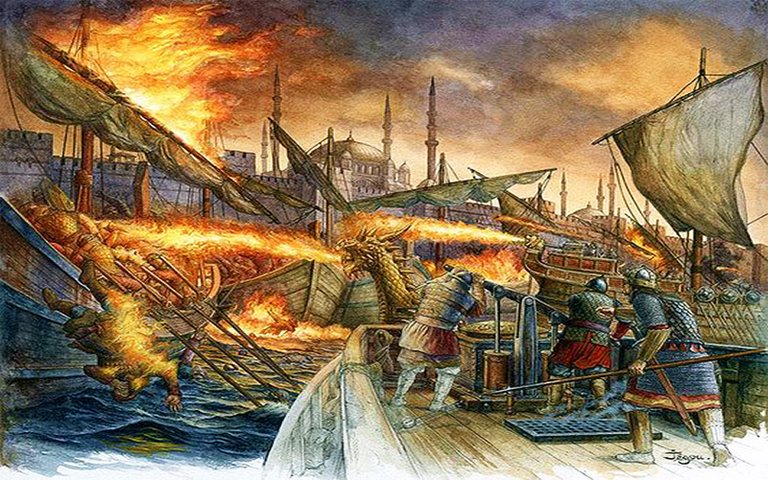Year 718. The Arab armies led by Abd al-Malik packed onto twenty warships are one step away from taking the Byzantine capital, Constantinople. Suddenly the besieged fleet moves decisively towards the enemy. On their ships, strange mouths that resemble dragons dominate the bow and, like dragons, they pour a mysterious fire on enemy ships. In a few seconds the entire stretch of sea is engulfed in flames, with deafening roars and blinding smoke. Without the Arabs being able to realize it, their ships quickly fell prey to flames and attempts to put out that inferno with water strangely fueled the fire, making the situation worse. The tragedy of the total loss of the fleet and men occurred for the besiegers and this gave impetus to the garrison of Constantinople which had been under attack for almost a year and advised the Muslims to prudently withdraw. This weapon was also used in the four-year period 674-678 and again during another siege of the city. In 515, the emperor Anastasius used, against his rival Vitaliano, a flammable sulfur-based mixture created centuries earlier by Proclus, an Athenian scholar.
The most likely hypothesis, however, was that "Greek fire" was not the result of an invention by a single author but rather a work of study and experimentation by the imperial chemists of Constantinople who perfected previous research by the Alexandrian school of the Hellenistic era. The deadly mixture appears to have contained naphtha enriched with substances such as pine resins, pitch, quicklime and saltpetre dosed sparingly according to well-defined and tested formulas. To spread the substance, a device was used that mixed everything together with a heating and pressurization process, a siphon then shot the flammable liquid a great distance. Over the years, due to the lack of supplies of basic ingredients, such as naphtha, its use became problematic and this contributed to the weakening of the empire until the final surrender in 1453. Today we know that the only way to neutralize the Greek fire was to use urine, vinegar or sand. It is undoubtedly one of the best kept secrets of antiquity and which the last Byzantines took with them to the grave.

The rewards earned on this comment will go directly to the people( @davideownzall ) sharing the post on Reddit as long as they are registered with @poshtoken. Sign up at https://hiveposh.com. Otherwise, rewards go to the author of the blog post.